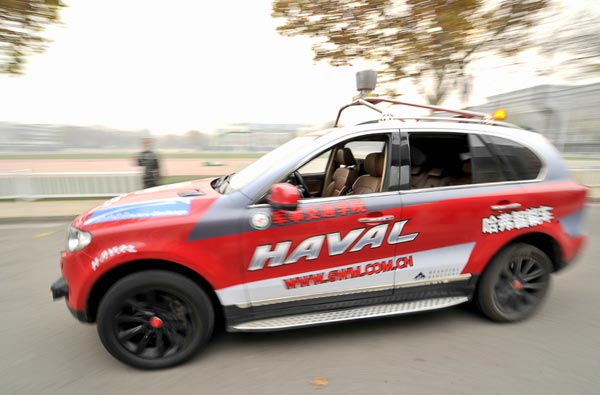Self-driving vehicles expected on roads in next few years
 0 Comment(s)
0 Comment(s) Print
Print E-mail China Daily, April 13, 2015
E-mail China Daily, April 13, 2015
|
|
|
A self-driving car developed by the PLA Transportation Academy is tested. [Photo/Xinhua] |
Don't panic if you see a driver in a moving car with no hands on the wheel because chances are the vehicle is self-driving.
Such scenes, previously only found in fiction, are likely to be reality very soon.
In late March, Volvo showcased self-driving technology in Beijing and wowed those who tried it.
"It's really amazing," said Su Lichuan, an auto reporter for China Business Times, when he saw a Swedish driver uncapping a bottle of water with both hands while the car he was in, a Volvo V60, raced along the capital's sixth-ring road guiding itself.
Su said he has been interested in the field of autonomous driving but he did not expect that the technology was so well developed.
Volvo tested its self-driving vehicles on public roads in Sweden as early as December 2013. The automaker, now owned by China's Geely Group, vowed to deliver 100 self-driving cars to its customers in 2017 as part of efforts to reduce traffic-related casualties.
Volvo is not alone in the field of autonomous driving, with many other automakers also busy testing similar programs.
Mercedes-Benz unveiled a self-driving truck in September 2014. The first of its kind worldwide, it was tested at up to 80 km/h on German expressways that same year.
The automaker launched a completely self-driving car called the F 015 Luxury in Motion at the 2015 Consumer Electronics Show in Las Vegas, the United States.
BMW has conducted tests on about 100 km of expressways in Germany since 2011. "We can already free drivers' hands, feet and eyes," Nevijo Mance, a senior researcher at BMW China Services, told news portal Jiemian.com.
He said BMW would realize complete autonomous driving so people don't have to focus on driving at all.
Other marques, including Infiniti, Ford, Hyundai, Toyota and Nissan, are experimenting with autonomous driving technology and many say they will unveil self-driving cars by around 2020.
Auto supplier Delphi said its car had just finished a 3,400-mile journey in the US, 99 percent of which was traveled in self-driving mode.
China's search giant Baidu confirmed it too is developing driverless cars and will produce them in cooperation with other manufacturers.
Consumer enthusiasm
Customers have shown similar enthusiasm for the technology.
News portal ifeng.com conducted a three-month online survey on autonomous driving in early 2015 and 82.5 percent of 1,107 respondents said they are either interested or would consider buying such cars.
BMW's survey results are even more optimistic. About 90 percent of its recent survey of 1,000 customers in China said they would like self-driving cars, according to Jiemian.com.
Despite such interest, the survey by ifeng.com shows that nearly 57 percent of respondents said they prefer autonomous driving to be an option so they can still take an active role, because driving itself is a pleasure.
"So we start by quasi-autonomous driving technology," said Chen Yu, a public relations manager at Volvo. "Such things as cruise control and automatic braking have been in the market for years, and automatic parking is coming soon."
Despite the technology's rapid progress, it will be some time before fully autonomous driving is commercialized, according to industry insiders.
Technologically speaking, almost all major automakers will be able to come up with their autonomous cars, but legislation might be a problem, said Mance at BMW.
One of the most frequently asked questions is if a person is killed in a traffic accident caused by a self-driving car, who will be held accountable, the driver or the automaker?
The Convention on Road Traffic passed in 1968 in Geneva, Switzerland, also stipulates that, "Every driver of a vehicle shall in all circumstances have his vehicle under control so as to be able to exercise due and proper care and to be at all times in a position to perform all maneuvers required of him."
The convention has been ratified by at least 70 countries worldwide.
Despite such legal setbacks, automakers believe that autonomous driving will prevail sooner or later.
It is a definite trend of transport in the future, especially as urbanization gains momentum worldwide, a public relations manager at Mercedes-Benz told China Daily.
Infiniti's president Roland Krueger shared the same idea. "Autonomous driving benefits road safety and emissions, and it enhances driving enjoyment and the overall quality of life."
"For example, we will be liberating the driver and enabling him or her to stay engaged with family and friends or even do business while stuck in traffic."







Go to Forum >>0 Comment(s)